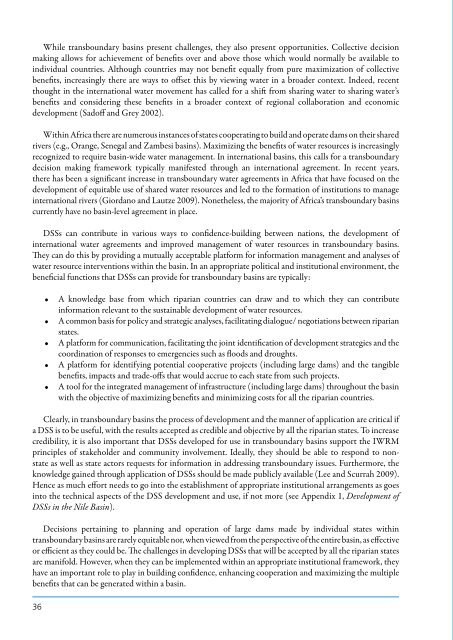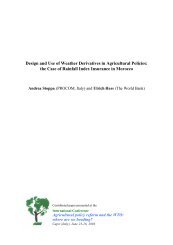Use of decision support systems to improve dam planning and dam ...
Use of decision support systems to improve dam planning and dam ...
Use of decision support systems to improve dam planning and dam ...
Create successful ePaper yourself
Turn your PDF publications into a flip-book with our unique Google optimized e-Paper software.
While transboundary basins present challenges, they also present opportunities. Collective <strong>decision</strong><br />
making allows for achievement <strong>of</strong> benefits over <strong>and</strong> above those which would normally be available <strong>to</strong><br />
individual countries. Although countries may not benefit equally from pure maximization <strong>of</strong> collective<br />
benefits, increasingly there are ways <strong>to</strong> <strong>of</strong>fset this by viewing water in a broader context. Indeed, recent<br />
thought in the international water movement has called for a shift from sharing water <strong>to</strong> sharing water’s<br />
benefits <strong>and</strong> considering these benefits in a broader context <strong>of</strong> regional collaboration <strong>and</strong> economic<br />
development (Sad<strong>of</strong>f <strong>and</strong> Grey 2002).<br />
Within Africa there are numerous instances <strong>of</strong> states cooperating <strong>to</strong> build <strong>and</strong> operate <strong>dam</strong>s on their shared<br />
rivers (e.g., Orange, Senegal <strong>and</strong> Zambesi basins). Maximizing the benefits <strong>of</strong> water resources is increasingly<br />
recognized <strong>to</strong> require basin-wide water management. In international basins, this calls for a transboundary<br />
<strong>decision</strong> making framework typically manifested through an international agreement. In recent years,<br />
there has been a significant increase in transboundary water agreements in Africa that have focused on the<br />
development <strong>of</strong> equitable use <strong>of</strong> shared water resources <strong>and</strong> led <strong>to</strong> the formation <strong>of</strong> institutions <strong>to</strong> manage<br />
international rivers (Giordano <strong>and</strong> Lautze 2009). Nonetheless, the majority <strong>of</strong> Africa’s transboundary basins<br />
currently have no basin-level agreement in place.<br />
DSSs can contribute in various ways <strong>to</strong> confidence-building between nations, the development <strong>of</strong><br />
international water agreements <strong>and</strong> <strong>improve</strong>d management <strong>of</strong> water resources in transboundary basins.<br />
They can do this by providing a mutually acceptable platform for information management <strong>and</strong> analyses <strong>of</strong><br />
water resource interventions within the basin. In an appropriate political <strong>and</strong> institutional environment, the<br />
beneficial functions that DSSs can provide for transboundary basins are typically:<br />
36<br />
• A knowledge base from which riparian countries can draw <strong>and</strong> <strong>to</strong> which they can contribute<br />
information relevant <strong>to</strong> the sustainable development <strong>of</strong> water resources.<br />
• A common basis for policy <strong>and</strong> strategic analyses, facilitating dialogue/ negotiations between riparian<br />
states.<br />
• A platform for communication, facilitating the joint identification <strong>of</strong> development strategies <strong>and</strong> the<br />
coordination <strong>of</strong> responses <strong>to</strong> emergencies such as floods <strong>and</strong> droughts.<br />
• A platform for identifying potential cooperative projects (including large <strong>dam</strong>s) <strong>and</strong> the tangible<br />
benefits, impacts <strong>and</strong> trade-<strong>of</strong>fs that would accrue <strong>to</strong> each state from such projects.<br />
• A <strong>to</strong>ol for the integrated management <strong>of</strong> infrastructure (including large <strong>dam</strong>s) throughout the basin<br />
with the objective <strong>of</strong> maximizing benefits <strong>and</strong> minimizing costs for all the riparian countries.<br />
Clearly, in transboundary basins the process <strong>of</strong> development <strong>and</strong> the manner <strong>of</strong> application are critical if<br />
a DSS is <strong>to</strong> be useful, with the results accepted as credible <strong>and</strong> objective by all the riparian states. To increase<br />
credibility, it is also important that DSSs developed for use in transboundary basins <strong>support</strong> the IWRM<br />
principles <strong>of</strong> stakeholder <strong>and</strong> community involvement. Ideally, they should be able <strong>to</strong> respond <strong>to</strong> nonstate<br />
as well as state ac<strong>to</strong>rs requests for information in addressing transboundary issues. Furthermore, the<br />
knowledge gained through application <strong>of</strong> DSSs should be made publicly available (Lee <strong>and</strong> Scurrah 2009).<br />
Hence as much effort needs <strong>to</strong> go in<strong>to</strong> the establishment <strong>of</strong> appropriate institutional arrangements as goes<br />
in<strong>to</strong> the technical aspects <strong>of</strong> the DSS development <strong>and</strong> use, if not more (see Appendix 1, Development <strong>of</strong><br />
DSSs in the Nile Basin).<br />
Decisions pertaining <strong>to</strong> <strong>planning</strong> <strong>and</strong> operation <strong>of</strong> large <strong>dam</strong>s made by individual states within<br />
transboundary basins are rarely equitable nor, when viewed from the perspective <strong>of</strong> the entire basin, as effective<br />
or efficient as they could be. The challenges in developing DSSs that will be accepted by all the riparian states<br />
are manifold. However, when they can be implemented within an appropriate institutional framework, they<br />
have an important role <strong>to</strong> play in building confidence, enhancing cooperation <strong>and</strong> maximizing the multiple<br />
benefits that can be generated within a basin.





